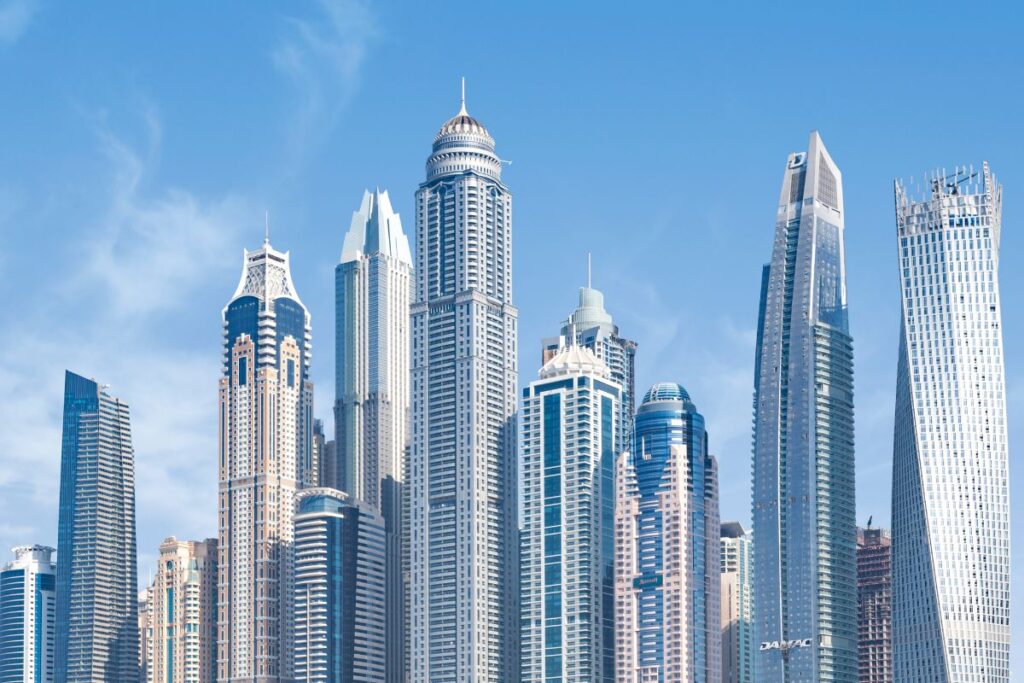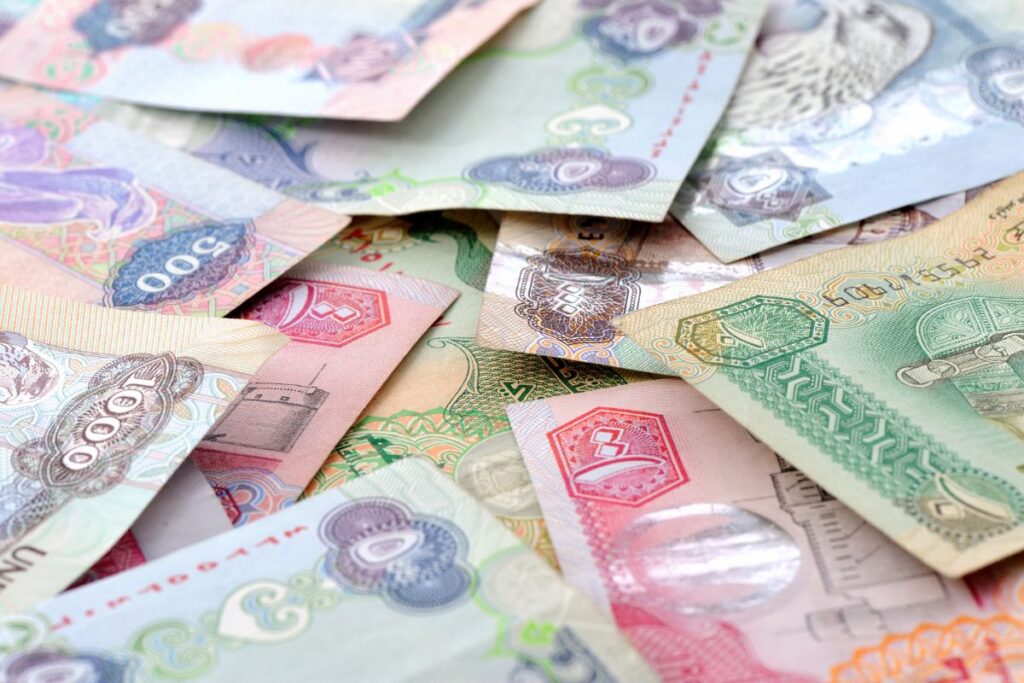Anchored by zero personal income tax, 100 per cent foreign ownership rules, and $817 billion in non-oil trade, the nation has transformed into a magnet for entrepreneurs, investors, and high-net-worth individuals (HNWIs) seeking to drive their way to millionaire status
But, how much can one build and save to hit AED1 million in the UAE?
Step 1: Make a “boring” UAE savings plan which can be automated

“The fastest path to AED1 million is a mix of clarity on your financial habits, consistency with investing, and the power of compound growth,” Carol Glynn – Chartered Accountant, Coach, and the founder of Conscious Finance Coaching – told Arabian Business.
“Start by tracking your spending and setting a clear savings and investment target. Avoid leaving large amounts of cash sitting idle, losing value in a low or no interest account. Instead, channel your surplus cash into diversified investments such as global ETFs, which offer long-term growth with relatively low fees while keeping short-term goals in high-interest savings accounts,” she said, adding that the UAE’s lack of income tax provides the great advantage of your gross income being your net income.
“Use that advantage wisely but be very careful of ‘get rich quick schemes’ or investments that make big promises that seem too good to be true – that is the fastest way to prevent you becoming a millionaire,” Glynn added.
Echoing the sentiment, Dubai-based UK FCA-registered financial expert, money coach and industry leader Mike Coady explained the best way to hit AED1 million in the UAE is to make a “boring” plan which can be automated.
“Start by automating your savings into a globally diversified investment portfolio. Set it and forget it. Don’t park your cash in a local bank hoping interest rates will grow it. Don’t chase high-risk crypto trends on Reddit. And don’t wait for the “right time” to invest, because time in the market is always better than trying to time it. You need a structure: monthly investing, diversified assets, and professional guidance,” he said, adding that while the tools exist in the UAE, the “problem is that most people don’t use them.”
So, if you are starting out to save and build your wealth, Coady suggest the following:
- Invest AED 10,000 per month at an average of 7% per year, and you’ll hit AED 1 million in around 6 years and 10 months.
- If you invest AED 5,000 per month under the same conditions, it’ll take you roughly 10.5 years.
“This depends on your timeline and return assumptions,” he said, adding that consistency is “everything.”
“You’re not trying to beat the market, you’re trying to beat your past habits. Every year you wait, the target gets further away. You should aim to invest at least 20–30 per cent of your monthly income if you’re serious about wealth creation in this region. Anything less, and you’re just treading water,” he said.
Coady explained that the UAE becomes a goldmine, “if you use it right.”
“A Brit earning AED60,000 a month is saving nearly AED20,000 in taxes compared to working in the UK. That’s nearly AED240,000 a year in potential investment capital. Most residents absorb that into their lifestyle. Smart residents invest it. If you pretend that ‘tax saving’ is untouchable and treat it as an automatic investment, you’ll reach your goals in half the time,” he said.
Step 2: But, where do I invest?

According to Glynn, the UAE “offers a unique opportunity – no tax on capital gains or dividends,” which makes global investments more appealing. These include:
- Irish-domiciled ETFs (for tax efficiency and access to global markets)
- Dubai/UAE REITs if you’re seeking real estate exposure with liquidity
- High-yield savings accounts for short-term savings
“Steer clear of anything you don’t fully understand – if it sounds too good to be true, it usually is,” she said.
As for side hustles and extra income streams, Glynn said that it depends on current income and savings ability.
“Employment incomes can be capped but your potential isn’t so if you are entrepreneurial, then having multiple sources of income is a great idea,” she said, adding that multiple income streams also “creates resilience” during recession or unforeseen job losses.
“Diversification of income is always a good idea. If your main income is disrupted, you have a fallback. Research show the average millionaire has 7 sources of income,” she said.
Other wealth building platforms, according to Coady, include:
- Low-cost index funds: Trackers like the S&P 500 or MSCI offer simplicity and scale.
- Discretionary portfolios: Professionally managed strategies tailored to risk appetite.
- Pension wrappers and tax-efficient structures: Especially important for expats who need to protect and future-proof their money.
“Your goal should be to build an investment ecosystem, not a random collection of assets. Don’t gamble with your future, structure it,” he said.
If you are also thinking of buying property to grow your money in the UAE, both experts advised this decision solely depends on individual goals, personal circumstances, a thorough understanding of the market and if it meets individual goals and risk appetite.
“For long-term residents, owning property can be a smart way to build wealth if you do your research. But remember a home is not an investment property, it is your home. UAE property markets have proven to be volatile in the past, so it’s essential to understand location, developer reputation, service charges, and your own time horizon,” Glynn said, adding that if the goal is to invest for rental income, consider that it could be vacant at times, maintenance costs and fees.
“Property carries significant upfront costs but can be a good investment as part of a balanced planned out portfolio,” she said.
Coady, on the other hand, said investing in property is a good way to grow money, however, it should be done with caution.
“Property has rebounded, and yields can be attractive. But ask yourself: Are you buying for rental income, capital growth, or personal use? Can you afford the costs of ownership (fees, maintenance, service charges)? Would this still make sense if you moved tomorrow?
“The UAE market is cyclical and sentiment driven. It can work and has worked but it’s not the whole plan. A property strategy should complement your investment portfolio, not replace it,” he said.
Step 3: Balance saving, investing, and enjoying life in the UAE

So, how can residents balance saving, investing, and enjoying life in the UAE?
“Create a clear financial structure, be intentional with how you live and what you are willing to use your money for,” Glynn said, recommending the 50-30-20 rule. Applicable to almost all income groups, this savings rule follows a 3-step strategy:
- 50 percent of your income for needs
- 30 percent of your income for wants
- 20 percent of your income for savings
“This kind of conscious planning lets you enjoy life now while building for later. Guilt-free spending, which is much more fun, comes from knowing your essentials are covered and your future is taken care of,” she said, further recommending that residents must prioritise long-term wealth building by:
- Maximising automated monthly investments
- Allocating bonuses and windfalls toward your financial goals
- Avoiding high-interest debt and ‘buy now, pay later’ traps
Understanding common money mistakes and pitfalls

While building wealth in investments and savings, it is important to be aware of some common mistakes that could hinder the process.
“Build financial literacy,” Coady said, revealing some of the most expensive mistakes:
- Living beyond their means: High salaries create false confidence. People lease cars they can’t afford and dine out daily, then wonder where their savings went.
- Overborrowing: Credit cards, car loans, and personal loans are handed out easily here. That doesn’t mean you should take them.
- Saving but not investing: Inflation will erode your cash. Compound interest only works if you use it.
- Taking advice from unregulated sources: Friends, colleagues, and unlicensed “advisers” can cost you more than you think.
Other pitfalls include not keeping an emergency fund and not understanding and considering hidden fees.
“Work with regulated professionals. And treat your finances like your health, preventative care always beats crisis management.
“The average expat won’t receive a pension, a state benefit, or a safety net when they leave the region. Understanding how to grow, protect, and access money isn’t optional, it’s a survival skill,” he advised. Recommended tools include:
- Apps: YNAB, Moneyhub, Plum
- Books: The Psychology of Money, Rich Dad Poor Dad, Simple Path to Wealth
- Professional support: Use regulated financial advisers, not keyboard warriors
“AED1 million is a checkpoint, not the summit. In fact, in 2025, it should be your minimum target if you plan to live a life of freedom and choice in the years ahead,” Coady said.
“Understanding money puts you more in control of your life, your life choices, and your future. Too many feel excluded from financial conversations because they’ve been taught money is ‘too complicated’. It’s not. Knowledge is power and in money, it’s peace of mind too.
“Don’t wait for the ‘right time’ to start saving or investing your savings, there is no one right time! Start small, stay consistent, and ask for support if you need it. You don’t need to know everything, you just need to begin,” Glynn added.
Echoing the sentiment, Coady said that being a millionaire in the UAE “is not a pipe dream.”
“It’s entirely achievable. But you need structure, patience, and the willingness to say “no” to short-term gratification. The UAE is one of the best places in the world to build wealth, if you treat it as a launchpad, not a playground. If you’re serious about taking that next step, seek professional advice, set a plan, and stick to it. Because the truth is: You don’t become wealthy by accident. You become wealthy by decision,” he concluded.












